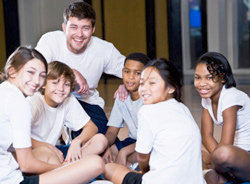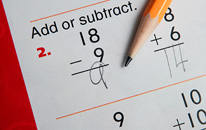Is Your Kid Athlete Eating the Right Foods?

by Peg Rosen
Healthy Kids from Teeth to Feet

Whether they’re scrambling for outfield hits, sticking back handsprings on the mat or swimming laps, kid athletes put heavy demands on their developing bodies. Eating well has a significant impact on their performance both on and off the field; says Amy Jamieson-Petonic, R.D., a spokeswoman for the Academy of Nutrition and Dietetics and director of wellness coaching at the Cleveland Clinic in Ohio.
Here are some expert food tips to keep your kid athletes in top form:
Fuel’em with complex carbs: The big difference between the nutritional needs of young athletes and their more sedentary counterparts is their greater demand for complex carbohydrates, which gives them the energy they need to perform; says nutritionist Ilyse Schapiro, M.S., R.D., C.D.N., who practices in Westchester County, N.Y. Fruits and veggies — plus whole-grain breads, pastas and rice — should make up 55-65 percent of their total daily calories, versus 40 percent for nonathletes.
Mix in protein and fats: Another 10-15 percent of your kid athlete’s daily calories should come from lean protein, including chicken, fish, eggs, beans and nuts, along with three to four servings (totaling 1,300 milligrams) of low-fat dairy or calcium-rich foods per day to build and strengthen bones. Athletes also burn more calories. Check with your pediatrician to see what your childs daily caloric needs are so you can be sure you’re meeting them.
Time it right: To avoid cramping and allow the body to digest and metabolize, kid athletes should eat full meals at least two hours before vigorous activity, says Schapiro. If that timing doesn’t work, feed your young athlete a satisfying snack that includes complex carbs and some protein no less than an hour before she hits the field. Peanut butter and jelly or turkey sandwiches are good options. A light complex carb snack, like whole-grain crackers and fresh fruit, is OK up to about a half hour before play.
Keep ’em hydrated: Children aren’t as efficient at producing sweat as adults are, so they’re more at risk of heat exhaustion, heat stroke and muscle cramps, says Schapiro. Kids should arrive at their sport having had at least one 8-ounce glass of water, and they should drink every 10-20 minutes during their workout even if they aren’t thirsty. Afterward, they should drink two or three cups of water or a sports drink, says Jamieson-Petonic.
Eating the right mix of foods at the right time and drinking enough liquids will help keep active, athletic kids at the top of their game.
has contributed to numerous magazines and websites, including Healthy Kids, MORE, Redbook, SELF, Real Simple, Parents, Family Circle, American Baby, ParentCenter.com and WebMD.com. She blogs at Relish-This.Blogspot.com.




